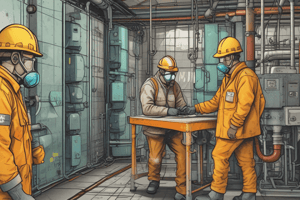Podcast
Questions and Answers
What is the primary goal of occupational safety and health?
What is the primary goal of occupational safety and health?
- To protect workers from hazards and preserve physical elements (correct)
- To increase productivity in factories and facilities
- To reduce medical and social insurance expenses for employers
- To enforce safety rules and regulations only
What is included in workplace safety?
What is included in workplace safety?
- Only personal protective equipment
- Only machine safety
- Only safety rules and regulations
- Awareness of labors, hazards, risks, and safety techniques (correct)
Why is occupational safety and health important?
Why is occupational safety and health important?
- To protect workers, reduce accidents, and preserve physical elements (correct)
- To increase productivity only
- To reduce accidents and injuries only
- To preserve physical elements only
What is the objective of introducing occupational safety and health principles?
What is the objective of introducing occupational safety and health principles?
What can be found in each workshop?
What can be found in each workshop?
Why is it important to make labors aware of safety measures?
Why is it important to make labors aware of safety measures?
What can be an enjoyable but also dangerous experience?
What can be an enjoyable but also dangerous experience?
What is included in the manufacturing process laboratory?
What is included in the manufacturing process laboratory?
Which of the following is NOT considered a mechanical hazard?
Which of the following is NOT considered a mechanical hazard?
Which of the following is NOT a common safety guideline for working in a machine shop?
Which of the following is NOT a common safety guideline for working in a machine shop?
What type of hazard is associated with molten materials?
What type of hazard is associated with molten materials?
Which of these workshops is associated with the highest risk of electrical hazards?
Which of these workshops is associated with the highest risk of electrical hazards?
What type of hazard could lead to chronic diseases due to repetitive motions and vibrations?
What type of hazard could lead to chronic diseases due to repetitive motions and vibrations?
Why is it important to remove burrs from workpieces?
Why is it important to remove burrs from workpieces?
Which type of personal protective equipment is essential for protecting against chemical hazards?
Which type of personal protective equipment is essential for protecting against chemical hazards?
Which of the following is NOT a potential cause of a slip, trip, or fall hazard in a machine shop?
Which of the following is NOT a potential cause of a slip, trip, or fall hazard in a machine shop?
Flashcards are hidden until you start studying
Study Notes
Importance of Occupational Safety and Health
- Occupational safety and health aims to protect workers from hazards, accidents, and diseases in various facilities and factories.
- The goal is to preserve physical elements, including buildings and establishments, from damage and reduce financial losses.
Workplace Safety
- Includes awareness of laborers about safety basics, hazards, and their risks.
- Involves implementation of hazard prevention devices, such as personal protective equipment, and safety techniques like machine safety, brochures, and posters.
- Also includes safety rules and regulations, labor training, and education to make workers aware of new safety measures.
Objectives of Occupational Safety and Health
- Acquaint students with hazards that may exist in each workplace.
- Introduce occupational safety and health principles to reduce accidents in each workshop.
Hazards in the Machine Shop
- Mechanical hazards: contact with moving parts, sharp edges, rough surfaces, or exposure to falling objects.
- Electrical hazards: electrical shock due to contact with live wires or electrical parts exposed.
- Thermal hazards: contact with molten materials or hot parts, leading to burns.
- Chemical hazards: exposure to toxic materials, leading to toxicity or suffocation.
- Physical hazards: slipping, trips, or falling.
- Other hazards: exposure to noise, repetitive motions, and vibrations, leading to chronic diseases.
Safety Guidelines
- Avoid wearing long clothing, jewelry, or scarves that might catch in rotating or moving parts.
- Remove rough and burrs from workpieces to prevent cuts upon contact.
- Always wear personal protective equipment to minimize the risk of external hazards.
Studying That Suits You
Use AI to generate personalized quizzes and flashcards to suit your learning preferences.



